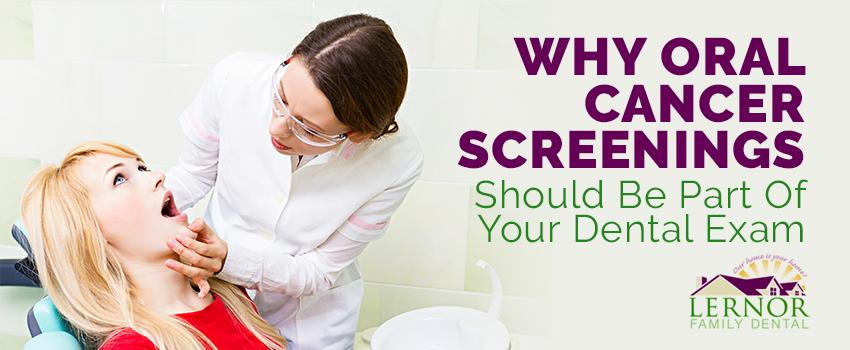
You may not think about oral cancer screenings as an essential part of your dental exam, but medical and oncology experts will tell you otherwise. According to the Oral Cancer Foundation, almost 50,000 Americans are diagnosed with oral cancer every year, with nearly half of them losing their lives to the deadly disease. One reason why so many people succumb to the disease is because it is incredibly hard to diagnose in its early stages. This statistic alone makes it deadlier than common cancers that people are more familiar with, such as:
- Cervical cancer
- Hodgkin’s lymphoma
- Laryngeal cancer
- Testicular cancer
- Thyroid cancer
Oral cancer is included in a “head and neck” cancer category but makes up 85% of those cases. Untreated, it can also spread (metastasize) into the lymph nodes and other parts of the body. Early Diagnosis is Key Seeing your dentist regularly for oral cancer screenings provides the best opportunity to have signs of oral cancer diagnosed as early as possible. The earlier that it’s caught, the better your chance of curative treatment. Even if you’re not experiencing symptoms of oral cancer, experts recommend screening exams on a routine basis, such as during your six-month exam and cleaning appointments. Your Dentist May be Your Best Defense Dentists are the only health experts that are routinely able to have an up-close, in-depth view of your oral tissues. As such, they play a particularly important role in the screening and diagnosis of oral cancer. In fact, you might have had oral cancer screenings at all of your dental appointments without even realizing it. Most of the time, you’ll hear something like: “Touch your tongue to the left cheek…touch your tongue to your right cheek.”“Stick your tongue out and say ‘ahh.’”“Lift your tongue to the roof of your mouth.” …Along with having your dentist feel the inside of your cheeks and floor of your mouth with a finger or two. Advanced oral cancer screening technology now makes it possible for oral health professionals to detect pathology before it’s visible to the naked eye. This factor means even earlier diagnosis and improved survival rates. Such tools often involve special lighting that makes specific types of cells respond differently to illumination, causing them to visually stand out during your exam. “But I Don’t Smoke” There’s a general assumption that in order to develop oral cancer, you have to use products such as tobacco (cigarettes, cigars, or smokeless/dip/snuff) and alcohol. While there is a link with these habits, they are not the sole cause of this deadly disease. Other risk factors include the human papilloma virus (HPV) as well as sun exposure (ultraviolet radiation.) As such, it can affect younger, otherwise healthy adults. Because of changes in lifestyles, HPV (which is also linked to cervical cancer) is more prevalent among young adults of both genders. Some research suggests that it may even be spread through kissing. Although all of these products or environmental factors can impact your chances of getting oral cancer, lack of them does not make you immune to developing the deadly disease. Perfectly healthy individuals who eat well, exercise, and abstain from alcohol/tobacco have been known to develop cancerous growths inside of their mouths. Where to Look The most common areas of the mouth for oral cancer to be found are near the back of the mouth around the base of the tongue and tonsils, sides of the tongue, the floor of the mouth, and around the lips. Additionally, it’s important to feel for abnormal tissues throughout the lymph nodes in the neck, which feed to the head and oral cavity. Symptoms to Make Your Dentist Aware Of Oral cancer typically manifests itself as a patch of tissue that doesn’t look like the area around it, such as lumps or white/red patches. They may also appear as small sores — like an ulcer — which do not heal in a timely manner. If you have had a sore for more than 14 days, alert your dentist immediately. While oral cancer may not be painful, any soreness or irritation may be a sign to be on the lookout for. Changes in your voice or chronic hoarseness should be looked into as well. Biopsies During your clinical exam, abnormal tissues may need to be monitored or a biopsy ordered. In some cases, a brush biopsy can be completed by your family dentist. Other times, a larger biopsy may need to be performed by a specialist. If the test comes back positive, you’ll be referred to an oral surgeon who will then determine the proper course of treatment (such as a referral to a specific oncologist in the area) or surgery that may be needed. Why Not? You have absolutely nothing to lose by having an oral cancer screening performed at every dental checkup. Skipping one would be like a woman turning down a PAP smear during her annual well woman appointment, or a man refusing to have a prostate exam during his yearly physical. Your health, your family, and your well-being simply aren’t worth passing up a simple opportunity that can have a huge impact on your future quality of life. Book an Oral Cancer Exam in Phoenix or Scottsdale Just like your teeth and gums, the other oral tissues inside of your mouth need to be routinely examined and monitored by a dental professional. At Lernor Family Dental, our family dentist performs a cancer screening on all patients, regardless of their age or health background. It’s something we feel is vital to the health of our patients, especially when it rests on our shoulders to provide the most accurate and timely diagnosis of head and neck pathology. If you’re looking for a new dentist or have questions about getting an oral cancer exam in Phoenix or Scottsdale, contact our practice today to schedule a new patient appointment. Be sure to ask about our private, in-house savings program for patients without dental insurance!
________________________
Screening for oral cancer is too important to ignore. Are you looking for a skilled oral cancer screening dentist in Phoenix? We can help! Dr. Lernor has decades of experience screening his patients for oral cancer and other periodontal issues. Schedule an appointment with Dr. Lernor or give him a call at (602) 483-4112 today.
